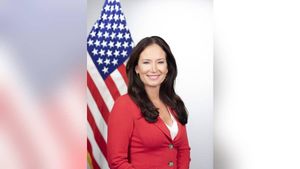President-elect Donald Trump has made waves with his recent nomination of Oregon Representative Lori Chavez-DeRemer as Secretary of Labor, to lead the Department of Labor during his second administration. This decision is particularly significant as Chavez-DeRemer has established herself as one of the few Republican supporters of pro-labor legislation during her brief tenure in Congress.
Chavez-DeRemer’s path to this nomination has been marked by her moderate stance within the Republican Party and her proactive efforts to engage with union representatives. Despite losing her seat to Democratic rival Janelle Bynum earlier this month, she has garnered attention for building strong relationships with labor groups, which is somewhat uncharacteristic for many within her party.
Trump unequivocally praised her efforts, stating, “I look forward to working with her to create tremendous opportunity for American Workers, to expand Training and Apprenticeships, to grow wages and improve working conditions, to bring back our Manufacturing jobs.” Even after her election defeat, Chavez-DeRemer continued to praise Trump, affirming her commitment to supporting working-class Americans under his leadership.
Chavez-DeRemer’s political background is quite interesting. She grew up as the daughter of a Teamster and has made her mark starting from local politics, eventually rising through the ranks to represent Oregon’s 5th Congressional District. She began her career on the Happy Valley City Council, later serving as the Mayor of Happy Valley, and won her Congressional seat after two attempts. Her bipartisan approach was notable; she was one of the most centrist members of Congress, as indicated by her voting record.
During her time on Capitol Hill, Chavez-DeRemer served on the Committee on Education and Workforce, tackling various workplace-related issues. She was one of just three House Republicans to co-sponsor the Protecting the Right to Organize (PRO) Act, which is aimed at strengthening workers’ rights to unionize—a move met with resistance from many conservative circles.
Despite her pro-labor record, skepticism remains among union leaders. Many express cautious optimism, pointing out the inherent contradictions within Trump’s policies toward labor during his first term. Union representatives like AFL-CIO President Liz Shuler noted, “It remains to be seen what she will be permitted to do as Secretary of Labor,” alluding to the challenges Chavez-DeRemer may face managing between labor interests and the President’s agenda.
Chavez-DeRemer’s nomination leads to questions about her future policies should she be confirmed. There’s widespread anticipation surrounding whether she will continue her support for labor rights, especially considering she was also one of the few Republicans to support the Public Service Freedom to Negotiate Act, which aims to expand bargaining rights for state and local workers, a demographic largely composed of women.
The Department of Labor could shift from the shadows of past administrations to become more central under Trump’s leadership, particularly since he is embarking on what he calls a pro-worker agenda. This sentiment resonates broadly with blue-collared American citizens, something Trump has capitalized on since his first campaign. Notably, he has historically faced backlash for aligning with business-friendly policies, so the appointment of someone who has sought labor endorsements adds another layer of intrigue.
Labor unions, aware of the delicate balance Chavez-DeRemer must maintain, are keeping close watch on her confirmation process. The president-elect’s previous administration was often criticized for its pro-business stance, leading to doubts concerning truly favorable policies for workers. The past record shows mixed results on labor issues; changes like the expansion of overtime eligibility were overshadowed by policies deemed unfavorable to unionization efforts.
Chavez-DeRemer’s prior endorsements from significant unions, including Teamsters Joint Council No. 37, show the potential allies she may have going forward, even if her relationship with the more significant labor organizations remains tentative at best. Some labor leaders believe she will need to convince stakeholders of her commitment to their interests over the president’s corporate-friendly agenda.
Chavez-DeRemer has reiterated her support for the working class. “Working-class Americans finally have a lifeline with you [Trump] in the White House. It’s time to bring our economy to new heights and secure a prosperous future for all hardworking Americans,” she remarked, highlighting her perspective on the looming changes she hopes to represent at the Labor Department.
While she has made her mark advocating for working people, skepticism remains about whether her agenda will truly result in tangible benefits for laborers across the nation. Activists are urging Chavez-DeRemer and Trump’s administration to prioritize funding for the Department of Labor, as many labor-related agencies have been chronically underfunded, resulting in insufficient enforcement of basic workplace rights.
Strategies like winning necessary funding, protecting workers’ overtime, and refusing to reinstate measures perceived as detrimental to workers’ rights will be telling signs of Chavez-DeRemer’s impact. The historical precedent set by Trump’s first term shows the need for vigilance on her part, as labor rights proponents call for concrete actions rather than mere rhetoric.
Among the most central issues inevitably facing Chavez-DeRemer and the Biden administration’s efforts include protecting worker safety on the job. With reports of inadequate safety inspections under the previous administration, stakeholders will demand significant reforms focused on occupational health and safety standards.
Should she be confirmed, Labor Secretary Chavez-DeRemer is expected to navigate the complex waters of labor rights and employee protections against the backdrop of Trump’s potentially contradictory policies. The anticipation surrounding her nomination reflects the divided sentiment between hope and caution from both labor advocates and business leaders.
Looking forward to her potential policies, Chavez-DeRemer stands at the precipice of what could be either significant support for labor unions or merely another chapter of uncertain efforts under Trump related to labor rights. Only time will tell how her actions will reflect her endorsement of workers’ interests and whether she will steer the administration toward genuine reforms beneficial for the American workforce.



